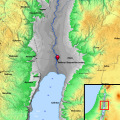19 This is the testimony of John, when the Jews sent to him priests and Levites from Jerusalem to ask him, "Who are you?" 20 And he confessed and did not deny, but confessed, "I am not the Christ." 21 They asked him, "What then? Are you Elijah?" And he said, "I am not." "Are you the Prophet?" And he answered, "No." 22 Then they said to him, "Who are you, so that we may give an answer to those who sent us? What do you say about yourself?" 23 He said, "I am A VOICE OF ONE CRYING IN THE WILDERNESS, `MAKE STRAIGHT THE WAY OF THE LORD,' as Isaiah the prophet said." 24 Now they had been sent from the Pharisees. 25 They asked him, and said to him, "Why then are you baptizing, if you are not the Christ, nor Elijah, nor the Prophet?" 26 John answered them saying, "I baptize in water, but among you stands One whom you do not know. 27 "It is He who comes after me, the thong of whose sandal I am not worthy to untie." 28 These things took place in Bethany beyond the Jordan, where John was baptizing.

29 The next day he saw Jesus coming to him and said, "Behold, the Lamb of God who takes away the sin of the world! 30 "This is He on behalf of whom I said, `After me comes a Man who has a higher rank than I, for He existed before me.' 31 "I did not recognize Him, but so that He might be manifested to Israel, I came baptizing in water." 32 John testified saying, "I have seen the Spirit descending as a dove out of heaven, and He remained upon Him. 33 "I did not recognize Him, but He who sent me to baptize in water said to me, `He upon whom you see the Spirit descending and remaining upon Him, this is the One who baptizes in the Holy Spirit.' 34 "I myself have seen, and have testified that this is the Son of God."
Commentary
This section, John 1:19-34, contains two paragraphs covering John’s answer to questions regarding two individuals: Jesus and himself. With his correct and confident identification of the two, we resultantly find it necessary for us to also know Jesus and ourselves. This account of John’s testimony will allow us to see obstacles and victories by having those two pieces of knowledge not only known, but well rehearsed.
Verses 19-28
This paragraph continues our way through the first chapter with the plain “testimony of John (the baptizer).” When are doing great things for God, being a part of His Kingdom by impacting others to follow God, you will be confused with the authorities. “Who are you?” they asked John. Inquisitors and, later, credible followers will think that you are at the head of the cause; that you possess supernatural abilities and talents. Perhaps you will let all those accolades consume you by making you think that you are special. After all, where would they be without you, your leadership and your message? “Who are you?” they asked John. I ask you, “who are you?” John, as we are, was tempted, I am sure, to lay hold of the recognition supposedly due to him. But, he was asked and he refused to be identified with some of the greatest Biblical characters in all Israel. “I am NOT….” he said. Would you properly align yourself with a servant laying aside the labeling, as wrong as it was, to brag on the one whom all identification and recognition rests? John did, and so should we.
John took the opportunity of the questioning by the priests and Levites from Jerusalem to verbalize what would later be lived out. The “priests and Levites from Jerusalem” could be equated with IRS agents from Washington, DC coming to pay you a visit. These agents, as the priests and Levites did, are representatives of another authority. The priests and the Levites where errand boys on behalf of the Pharisees. Remember, that whatever information the Pharisees would get would be second hand. John will further unfold the role of Pharisees in the life of Jesus. And, we will need to remember how their first impression of Jesus was second hand.
Bethany beyond the Jordan refers to a town on the east side of the Jordan River about 5 miles north of the Dead Sea.
Verse 29 begins a new day. John is baptizing in Bethany beyond the Jordan and he sees Jesus. What a mighty proclamation of identifying the One who removes our sin from us. What is your proclamation of Him?
The priests and Levites appear to have returned to Jerusalem to give their account to the Pharisees. They are returning with incomplete information. They know who John is not but they did not find out the identity of the one John spoke.
Verse 30 states that Jesus “existed before” John. This is John’s statement to the fact that Jesus was eternal for John, the son of Zechariah and Elizabeth (Luke 1:35-45), was Jesus’ older cousin. This is one citing that gives credence to John 1:1 and 14 “In the beginning was the Word…. And the Word became flesh and dwelt among us.”
Verse 31 lets us know that John did not always know that his cousin was born to be the One. At the time of him baptizing Jesus he then becomes awakened to the true identity of Jesus. John was willing to take on a support role in order to escort the Jesus to the nation of Israel. Who do you support in such a manner?
Verses 32 through 34 contain John’s account of the testimony of the Holy Spirit. This gospel, while being a topical account of the life of Jesus, will also do much to educate us on the person and role of the Holy Spirit. Here, as is customary throughout this gospel account, the Holy Spirit is clarifying the Son of God. Jesus, the Son of God, although previously unknown, is now identified as the One who baptizes (present active participle not future tense) with the Holy Spirit (πνεύματι ἁγίῳ ‘Holy Spirit’ not “Holy Ghost’). The baptizing (of the Holy Spirit), to some extent, happened during the life of Jesus which predates the Pentecost event in Acts 2.
Who are you like? Who more closely resembles you?
John: He knows himself and his role in the bigger picture. He is confident in that role so that he fields questions that might steer him off course. He dismisses opportunities to be mistakenly identified as someone of higher stature. He is humbly bold in proclaiming Jesus and His purpose to his circle of influence.
Priests and Levites: This group is serving as messengers by doing the bidding of another group. They might take the information they gather to heart, but they are largely asking questions for someone else. They appear inquisitive but we may wonder if they are acting on their own accord and possess original thought.
Pharisees: They do not dare to be seen with this ruffian. They send someone else to do their dirty work. They inquire by proxy. They are content to live their lives and make decisions based on third hand information.
Which of the above characters characterizes you? Be it said that there is nothing wrong with questions as long as the questions lead to a life characterized by John: knowing oneself and knowing Christ. Questions can be destructive if they are the shroud behind which we hide ourselves refusing to yield to the Eternal Word who is the Son of God.

No comments:
Post a Comment